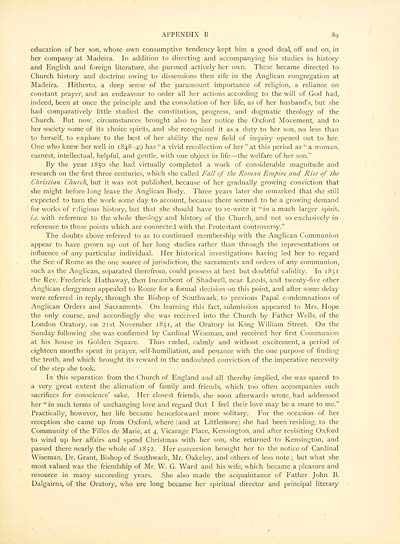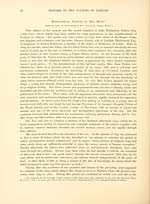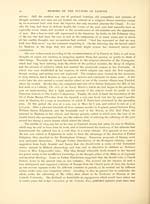Memoirs of the Fultons of Lisburn
(99) Page 89
Download files
Complete book:
Individual page:
Thumbnail gallery: Grid view | List view

APPENDIX B 89
education of her son, whose own consumptive tendency kept him a good deal, off and on, in
her company at Madeira. In addition to directing and accompanying his studies in history
and English and foreign literature, she pursued actively her own. These became directed to
Church history and doctrine owing to dissensions then rife in the Anglican congregation at
Madeira. Hitherto, a deep sense of the paramount importance of religion, a reliance on
constant prayer, and an endeavour to order all her actions according to the will of God had,
indeed, been at once the principle and the consolation of her life, as of her husband's, but she
had comparatively little studied the constitution, progress, and dogmatic theology of the
Church. But now, circumstances brought also to her notice the Oxford Movement, and to
her society some of its choice spirits, and she recognized it as a duty to her son, no less than
to herself, to explore to the best of her ability the new field of inquiry opened out to her.
One who knew her well in 1848-49 has " a vivid recollection of her " at this period as " a woman,
earnest, intellectual, helpful, and gentle, with one object in life — the welfare of her son."
By the year 1850 she had virtually completed a work of considerable magnitude and
research on the first three centuries, which she called Fall of the Roman Empire and Rise of the
Christian Church, but it was not published, because of her gradually growing conviction that
she might before long leave the Anglican Body. Three years later she remarked that she still
expected to turn the work some day to account, because there seemed to be a growing demand
for works of religious history, but that she should have to re-write it " in a much larger spirit,
i.e. with reference to the whole theology and history of the Church, and not so exclusively in
reference to those points which are connected with the Protestant controversy."
The doubts above referred to as to continued membership with the Anglican Communion
appear to have grown up out of her long studies rather than through the representations or
influence of any particular individual. Her historical investigations having led her to regard
the See of Rome as the one source of jurisdiction, the sacraments and orders of any communion,
such as the Anglican, separated therefrom, could possess at best but doubtful validity. In 185 1
the Rev. Frederick Hathaway, then Incumbent of Shadwell, near Leeds, and twenty-five other
Anglican clergymen appealed to Rome for a formal decision on this point, and after some delay
were referred in reply, through the Bishop of Southwark, to previous Papal condemnations of
Anglican Orders and Sacraments. On learning this fact, submission appeared to Mrs. Hope
the only course, and accordingly she was received into the Church by Father Wells, of the
London Oratory, on 21st November 1S51, at the Oratory in King William Street. On the
Sunday following she was confirmed by Cardinal Wiseman, and received her first Communion
at his house in Golden Square. Thus ended, calmly and without excitement, a period of
eighteen months spent in prayer, self-humiliation, and penance with the one purpose of finding
the truth, and which brought its reward in the undoubted conviction of the imperative necessity
of the step she took.
In this separation from the Church of England and all thereby implied, she was spared to
a very great extent the alienation of family and friends, which too often accompanies such
sacrifices for conscience' sake. Her closest friends, she soon afterwards wrote, had addressed
her " in such terms of unchanging love and regard that I feel their love may be a snare to me."
Practically, however, her life became henceforward more solitary. For the occasion of her
reception she came up from Oxford, where (and at Littlemore) she had been residing, to the
Community of the Filles de Marie, at 4, Vicarage Place, Kensington, and after revisiting Oxford
to wind up her affairs and spend Christmas with her son, she returned to Kensington, and
passed there nearly the whole of 1852. Her conversion brought her to the notice of Cardinal
Wiseman, Dr. Grant, Bishop of Southwark, Mr. Oakeley, and others of less note ; but what she
most valued was the friendship of Mr. W. G. Ward and his wife, which became a pleasure and
resource in many succeeding years. She also made the acquaintance of Father John B.
Dalgairns, of the Oratory, who ere long became her spiritual director and principal literary
education of her son, whose own consumptive tendency kept him a good deal, off and on, in
her company at Madeira. In addition to directing and accompanying his studies in history
and English and foreign literature, she pursued actively her own. These became directed to
Church history and doctrine owing to dissensions then rife in the Anglican congregation at
Madeira. Hitherto, a deep sense of the paramount importance of religion, a reliance on
constant prayer, and an endeavour to order all her actions according to the will of God had,
indeed, been at once the principle and the consolation of her life, as of her husband's, but she
had comparatively little studied the constitution, progress, and dogmatic theology of the
Church. But now, circumstances brought also to her notice the Oxford Movement, and to
her society some of its choice spirits, and she recognized it as a duty to her son, no less than
to herself, to explore to the best of her ability the new field of inquiry opened out to her.
One who knew her well in 1848-49 has " a vivid recollection of her " at this period as " a woman,
earnest, intellectual, helpful, and gentle, with one object in life — the welfare of her son."
By the year 1850 she had virtually completed a work of considerable magnitude and
research on the first three centuries, which she called Fall of the Roman Empire and Rise of the
Christian Church, but it was not published, because of her gradually growing conviction that
she might before long leave the Anglican Body. Three years later she remarked that she still
expected to turn the work some day to account, because there seemed to be a growing demand
for works of religious history, but that she should have to re-write it " in a much larger spirit,
i.e. with reference to the whole theology and history of the Church, and not so exclusively in
reference to those points which are connected with the Protestant controversy."
The doubts above referred to as to continued membership with the Anglican Communion
appear to have grown up out of her long studies rather than through the representations or
influence of any particular individual. Her historical investigations having led her to regard
the See of Rome as the one source of jurisdiction, the sacraments and orders of any communion,
such as the Anglican, separated therefrom, could possess at best but doubtful validity. In 185 1
the Rev. Frederick Hathaway, then Incumbent of Shadwell, near Leeds, and twenty-five other
Anglican clergymen appealed to Rome for a formal decision on this point, and after some delay
were referred in reply, through the Bishop of Southwark, to previous Papal condemnations of
Anglican Orders and Sacraments. On learning this fact, submission appeared to Mrs. Hope
the only course, and accordingly she was received into the Church by Father Wells, of the
London Oratory, on 21st November 1S51, at the Oratory in King William Street. On the
Sunday following she was confirmed by Cardinal Wiseman, and received her first Communion
at his house in Golden Square. Thus ended, calmly and without excitement, a period of
eighteen months spent in prayer, self-humiliation, and penance with the one purpose of finding
the truth, and which brought its reward in the undoubted conviction of the imperative necessity
of the step she took.
In this separation from the Church of England and all thereby implied, she was spared to
a very great extent the alienation of family and friends, which too often accompanies such
sacrifices for conscience' sake. Her closest friends, she soon afterwards wrote, had addressed
her " in such terms of unchanging love and regard that I feel their love may be a snare to me."
Practically, however, her life became henceforward more solitary. For the occasion of her
reception she came up from Oxford, where (and at Littlemore) she had been residing, to the
Community of the Filles de Marie, at 4, Vicarage Place, Kensington, and after revisiting Oxford
to wind up her affairs and spend Christmas with her son, she returned to Kensington, and
passed there nearly the whole of 1852. Her conversion brought her to the notice of Cardinal
Wiseman, Dr. Grant, Bishop of Southwark, Mr. Oakeley, and others of less note ; but what she
most valued was the friendship of Mr. W. G. Ward and his wife, which became a pleasure and
resource in many succeeding years. She also made the acquaintance of Father John B.
Dalgairns, of the Oratory, who ere long became her spiritual director and principal literary
Set display mode to:
![]() Universal Viewer |
Universal Viewer | ![]() Mirador |
Large image | Transcription
Mirador |
Large image | Transcription
Images and transcriptions on this page, including medium image downloads, may be used under the Creative Commons Attribution 4.0 International Licence unless otherwise stated. ![]()
| Histories of Scottish families > Memoirs of the Fultons of Lisburn > (99) Page 89 |
|---|
| Permanent URL | https://digital.nls.uk/95604325 |
|---|
| Description | A selection of almost 400 printed items relating to the history of Scottish families, mostly dating from the 19th and early 20th centuries. Includes memoirs, genealogies and clan histories, with a few produced by emigrant families. The earliest family history goes back to AD 916. |
|---|

